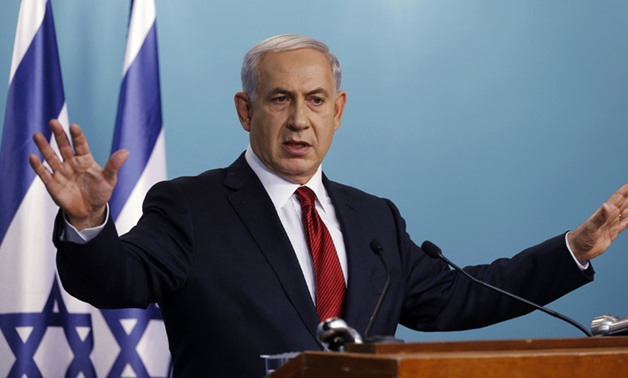
Israel's Prime Minister Benjamin Netanyahu delivers a statement to the media in Jerusalem November 18, 2014. Photo from Reuters
CAIRO - 13 September 2017: In an official statement early on Wednesday, Israeli Prime Minister Benjamin Netanyahu became the first state leader to publically voice support for the establishment of an independent Kurdistan in Iraq. Israel has long been sympathetic to the Kurds and has maintained discreet economic, military and intelligence ties with the Kurds since the 1960s.
"(Israel) supports the legitimate efforts of the Kurdish people to attain a state of its own," said Netanyahu.
This extends upon remarks he made in 2014 where, in a speech at Tel Aviv University's Institute for National Security Studies, he stated: "We need to support the Kurdish aspiration for independence. They deserve it."
Israel views the Kurds, who are split between Iraq, Iran, Turkey and Syria, as a buffer against Arab predominance in the region.
However, concerning the Kurdistan Workers’ Party (PKK), "Israel rejects the PKK and considers it a terrorist organization,” said Netanyahu. The PKK have been involved in a decades-long war with Turkey.
 General view of the Kurdistan Parliament meeting in Erbil, Iraq September 15, 2107. REUTERS/Azad Lashkari
General view of the Kurdistan Parliament meeting in Erbil, Iraq September 15, 2107. REUTERS/Azad Lashkari
In other developments, Iraq’s Parliament voted on Tuesday to reject the Iraqi Kurdish independence referendum as ‘non-binding’, authorizing Prime Minister Haider al-Abadi to take all measures to preserve Iraq’s unity.
The vote required the government to “take all steps to protect the unity of Iraq and open a serious dialogue” with Iraqi Kurdish leaders, speaker Salim al-Juburi said.
In a show of defiance, Kurdish parliamentarians boycotted the vote.
“Kurdish lawmakers walked out of (Tuesday‘s) session but the decision to reject the referendum was passed by a majority,” said Mohammed al-Karbouli, an Iraqi lawmaker.
Yet the President of the Kurdistan region, Masoud Barzani, has contended that the vote will go ahead as planned, and that a dialogue with Baghdad will resume after the September 25.
 Iraqi Kurdish President Masoud Barzani walks behind a security service staff member during his visit in Kirkuk, Iraq September 12, 2017. REUTERS/Ako Rasheed
Iraqi Kurdish President Masoud Barzani walks behind a security service staff member during his visit in Kirkuk, Iraq September 12, 2017. REUTERS/Ako Rasheed
“I call upon the Kurdish leadership to come to Baghdad and conclude a dialogue,” al-Abadi said in a press conference after the vote.
Many opponents to the independence referendum are concerned that if a ‘Yes’ vote prevails, attention will be drawn away from the fight against the Islamic State and that tensions between Kurds and Arabs in Iraq could turn violent.
The U.S. presidential envoy to the Global Coalition against the Islamic State, Brett McGurk, is expected to meet with Barzani on Wednesday, Kurdish official Muhammed Haji Mahmud told BasNews.
Analysis:
In a highly influential move, Netanyahu has publically stated Israel’s support for an independent Kurdistan. If the expectation proves correct and the ‘Yes’ vote prevails, the first country to recognize an independent Kurdistan will be in an influential position. The Kurds are a minority in the region, much like the Jews, and Israel hopes to solidify a strong relationship with Erbil in order to present a united opposition to Arab hegemony in the region.
However, Israel’s move sheds light on some interesting questions, as the plight of the Kurds in Iraq has many parallels with the struggle of the Palestinians for statehood. Netanyahu’s vocal support for a two-state solution, while wavering, has continued to exist during his tenure. However, in reality this does not hold true. Under Netanyahu’s conservative leadership settlements have continued to encroach into Palestinian territories in the West Bank, and the government has been persistently hostile towards Palestinians, especially in Gaza where a blockade has been in place since 2007 and the war in 2014 which killed an estimated 1,500 Gazan civilians in seven weeks of conflict. The election of Donald Trump has only bolstered Netanyahu to adopt a more conservative position.
In reality, Israel determinedly denies Palestinians the steps leading towards a two-state solution. Yet, this is what Netanyahu is advocating in respect to the Kurds in Iraq. The Kurds have pushed for their state since the 1916 Sykes-Picot Agreement drew lines in the sand, much like the Palestinians who have struggled to form an internationally recognized state since the 1917 Balfour Declaration announced support for the establishment of a "national home" for Jewish people in Palestine.
With this arguably hypercritical move, Netanyahu aspires to form a strong alliance under the premise that “the enemy of my enemy is my friend,” yet this will only contribute to instability in the region. If the ‘Yes’ vote prevails, Iraq cannot force the Kurds into the hands of Israel, polarizing the region. As al-Abadi and many stake-holders have stated, a dialogue is essential between Erbil and Baghdad; however, this dialogue cannot be supplemented and underpinned by military force which may entice foreign involvement.



Comments
Leave a Comment